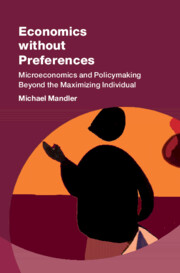Book contents
- Frontmatter
- Contents
- Figures
- Preface
- 1 Introduction: Marginal Utility Matters
- Part I Trade-Offs and Rationality
- 2 The Rise and Fall of Utility as an Ordering Principle
- 3 Incomplete Preferences, Global and Local
- 4 The Rationality of Choice
- 5 Safety Bias
- 6 The Myth of the Indifference Curve
- Part II Economic Analysis and Policy Without Preferences
- Appendix
- Bibliography
- Index
4 - The Rationality of Choice
from Part I - Trade-Offs and Rationality
Published online by Cambridge University Press: 02 January 2025
- Frontmatter
- Contents
- Figures
- Preface
- 1 Introduction: Marginal Utility Matters
- Part I Trade-Offs and Rationality
- 2 The Rise and Fall of Utility as an Ordering Principle
- 3 Incomplete Preferences, Global and Local
- 4 The Rationality of Choice
- 5 Safety Bias
- 6 The Myth of the Indifference Curve
- Part II Economic Analysis and Policy Without Preferences
- Appendix
- Bibliography
- Index
Summary
Agents are classically considered rational in economics if their preferences satisfy the completeness and transitivity axioms. But no matter how preferences are defined, an agent can always violate these axioms without making decisions that leave the agent worse off. If preferences are defined by an agent’s welfare judgments, those judgments can be incomplete, while if preferences are defined by an agent’s choices then sequences of those choices can be intransitive. In both cases, agents can shield themselves from harm simply by maintaining the status quo unless offered an unambiguously superior option. Agents will then display several of the anomalies discovered by behavioral economists, including the endowment effect, loss aversion, and the willingness-to-accept/willingness-to-pay disparity. These behaviors are therefore consequences rather than violations of rationality. Moreover, a single set of preference judgments can explain all of the choices an agent makes through time; the theory therefore wields predictive power. Behavioral economics in contrast courts unfalsifiability by positing a separate preference for an agent at every decision-making juncture.
- Type
- Chapter
- Information
- Economics without PreferencesMicroeconomics and Policymaking Beyond the Maximizing Individual, pp. 59 - 85Publisher: Cambridge University PressPrint publication year: 2025

